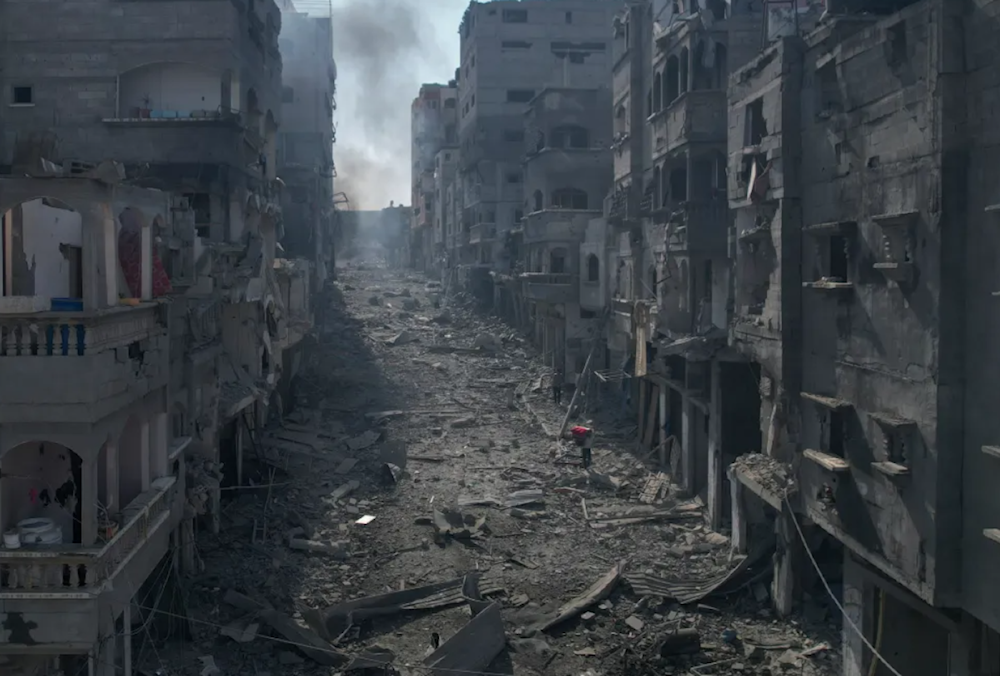Gaza economy left in 'utter ruin', 350 years needed to salvage Strip
According to UNCTAD, Gaza saw its worst economic downturn in recent memory during the fourth quarter of 2023.
-

Rubble litters a street between smoldering buildings hit by an Israeli air raid on the Jabalia refugee camp (Undated, AP)
The United Nations has warned that Gaza's economy has been left in "utter ruin" due to the Israeli year-long war, with recovery to pre-war levels expected to take 350 years.
According to a report from the UN's trade and development arm (UNCTAD), the war that began last year has devastated Gaza's economy and infrastructure.
The report, presented at last month’s UN General Assembly, noted that economic activity in Gaza—already weak before the war—has nearly come to a standstill, except for essential humanitarian health and food services amid severe shortages of water, fuel, and electricity, along with significant access restrictions.
Construction output has plummeted by 96%, agriculture by 93%, manufacturing by 92%, and the services sector by 76%. Unemployment reached 81.7% in the first quarter of 2024, a rate the UN predicts will worsen or remain high as military operations continue.
Read more: UNDP estimates 69-year setback in Gaza's development
According to the report, the brutal strikes have resulted in "an unprecedented humanitarian, environmental and social catastrophe and propelled Gaza from de-development to utter ruin,” emphasizing that “the far-reaching repercussions will linger for years to come, and it may take decades to return Gaza to the status quo ante."
“Once a ceasefire is reached, a return to the 2007–2022 growth trend would imply that it would take Gaza 350 years just to restore GDP to its level in 2022.”
The report said the past 12 months of war had followed a period between 2007 and 2022 when the economy of Gaza had been severely affected by restrictions imposed by "Israel" on the movement of goods and people.
The UN called the revenue loss caused by the restrictions and military aggression "staggering".
“According to thorough estimations described in the present report, in the absence of those constraints, by the end of 2023 it is estimated that Gaza’s gross domestic product (GDP) would have been, on average, 77.6% higher than its actual level," adding that this means an estimated cumulative loss of "$35.8bn of unrealized GDP potential during the period 2007–2023 – equivalent to 17 times the GDP of Gaza in 2023.”
The economy of Gaza contracted at an annual pace of roughly 3% in the first three quarters of 2023, before the war began. Overall, it fell by 22.6% in 2023, with the fourth quarter accounting for 90% of the decline.
According to the research, by the end of July 2024, 88% of school buildings had been damaged, 21 out of 36 hospitals were out of service, and 45 out of 105 basic healthcare institutions were not operating. More than 62% of residential structures were damaged or destroyed, while more than 59% of water, sanitation, and hygiene infrastructure was severely damaged, affecting water and sanitation services.
According to UNCTAD, Gaza saw its worst economic downturn in recent memory during the fourth quarter of 2023. GDP declined by 80.8% compared to the third quarter of 2023, while GDP per capita fell by 81.4%.
UNCTAD report unveils devastating economic decline in Gaza, West Bank
Last month, UNCTAD reported that since the start of the Israeli genocidal war on Palestine's Gaza Strip, the sector's economy has shrunk to less than one-sixth of its size. In parallel, the West Bank also faced "a rapid and alarming economic decline" since the beginning of "Israel's" expansion of its ethnic cleansing campaign across the occupied Palestinian territories where unemployment almost tripled.
These numbers were revealed by a United Nations Conference on Trade and Development (UNCTAD) report, which underscored the challenges of reconstruction and described Gaza's current economy as "in ruins".
"The Palestinian economy is in freefall," UNCTAD Deputy Secretary-General Pedro Manuel Moreno told reporters in Geneva, stressing that "the report calls for the international community to halt this economic freefall, address the humanitarian crisis, and lay the groundwork for lasting peace and development."
Moreno then emphasized the need for a comprehensive plan as the Palestinian Authority (PA) in the occupied West Bank remains under "immense pressure" that is jeopardizing its ability to function.
According to UNCTAD, more than 300,000 jobs have been lost in the West Bank since the war began, raising the unemployment rate from 12.9% to 32%.
The decline has been attributed to the Israeli aggression, which the UN says has resulted in the killing of more than 650 Palestinians with Israeli occupation fire since October 7. Additionally, since Operation Al-Aqsa Flood, the Israeli occupation has increased the number of checkpoints surrounding the occupied West Bank.

 5 Min Read
5 Min Read








